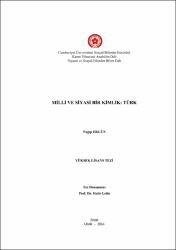| dc.contributor.advisor | Çetin, Halis | |
| dc.contributor.author | Ergün, Ragıp | |
| dc.date.accessioned | 2020-02-27T09:10:12Z | |
| dc.date.available | 2020-02-27T09:10:12Z | |
| dc.date.issued | 2014 | tr |
| dc.date.submitted | 2014-01-14 | |
| dc.identifier.other | ii, 123 | |
| dc.identifier.uri | https://hdl.handle.net/20.500.12418/12304 | |
| dc.description.abstract | ERGÜN, Ragıp, Milli ve Siyasi Bir Kimlik: Türk, Yüksek Lisans Tezi, Sivas, 2014.
Fransız İhtilali’nin oluşturduğu ulusçu/milliyetçi akım sonrasında kimlik, farkına varılan ve farkındalık yaratmak için kullanılan bir olgu haline gelmiştir. Fransız İhtilali’nden önce daha informel olan bu tanımlama/tanımlanma biçimi Fransız İhtilali ve devamındaki birçok akımla beraber daha sistematik bir hal almıştır.
Millet kelimesinin modern manasıyla “nation” karşılığı olarak kullanılması oldukça yenidir. Eskiden bu kelime, İslam dinine girenlerin teşkil ettiği büyük cemaati ifade ederdi. Millet kavramı Türkiye toplumunda da anlamsal bir dönüşüm yaşamış, daha kültürel bir anlam içererek “bir milletin kendisine özgü düşünüş ve yaşayış biçimi, dil, töre ve gelenekleri, toplumsal değer yargıları ve kuralları ile oluşan özellikler bütünü, milli hüviyet” olarak tanımlanmıştır.
Etnik kimlik, aynı kültür boyutunda yer alan bir insan grubunun, sübjektif, sembolik ve amblematik amaçlarla, grup içinde dayanışma sağlamak ve öteki gruplarla farklılıkları ifade etmektedir.
Ulusal kimlik günümüzde kullanılan anlamı ile belli bir grubun kendini ortak dil, din, tarih, soy, mekan gibi unsurların biri, birkaçı ya da hepsi üzerinden tanımladığı siyasi ve kültürel bir birimdir.
“Türk” kavramı ve Türk’ün tarihi kökenleri hakkında yazılmış kaynaklarda çeşitli, birbirinden farklı bilgiler yer almaktadır. Bu bilgilerin farklı olmasının nedenleri arasında sosyal, siyasal, kültürel ve dini nedenler bulunmaktadır. | tr |
| dc.description.abstract | ERGÜN, Ragıp, A National And Political Identity: Turk, Master Thesis, Sivas, 2014.
Identity has become a phenomenon that can be recognized and used to create awareness after the nationalist movement, which was the result of the French Revolution. This defining and being defined form that was more informal before the French Revolution has become more systematic with the French Revolution and various movements later on.
It is pretty new to use of the word community in modern sense as “nation”. In the past, this word would refer to a large communion formed by the ones belonging to Islam. The concept of “nation” also experiences a semantic transformation in Turkish society and by containing more cultural meaning, it is defined as “a nation who has its own way of thinking, lifestyle, language, customs and traditions, social norms and rules, and as a national identity”.
Ethnic identity represents a group of people who are in the same cultural dimension promote solidarity within the group with subjective, symbolic and emblematic purposes and their differences from other groups.
National identity, with its widely used meaning at the present, is a political and cultural unit that a certain group defines themselves with one, some or all of the factors such as language, religion, history, ancestry, and place.
There is various and different information in the sources written on the concept of “Turk” and the historical origins of Turks. Among the reasons why this information is different are some causes such as social, political, cultural and religious. | tr |
| dc.language.iso | tur | tr |
| dc.publisher | Sivas Cumhuriyet Üniversitesi-Sosyal Bilimler Enstitüsü | tr |
| dc.rights | info:eu-repo/semantics/openAccess | tr |
| dc.subject | Türk | tr |
| dc.subject | Etnik Kimlik | tr |
| dc.subject | Kimlik | tr |
| dc.subject | Mili Kimlik | tr |
| dc.subject | Ulusal Kimlik | tr |
| dc.title | Milli ve Siyasi Bir Kimlik: Türk | tr |
| dc.type | masterThesis | tr |
| dc.contributor.department | Sosyal Bilimler Enstitüsü | tr |
| dc.relation.publicationcategory | Tez | tr |















